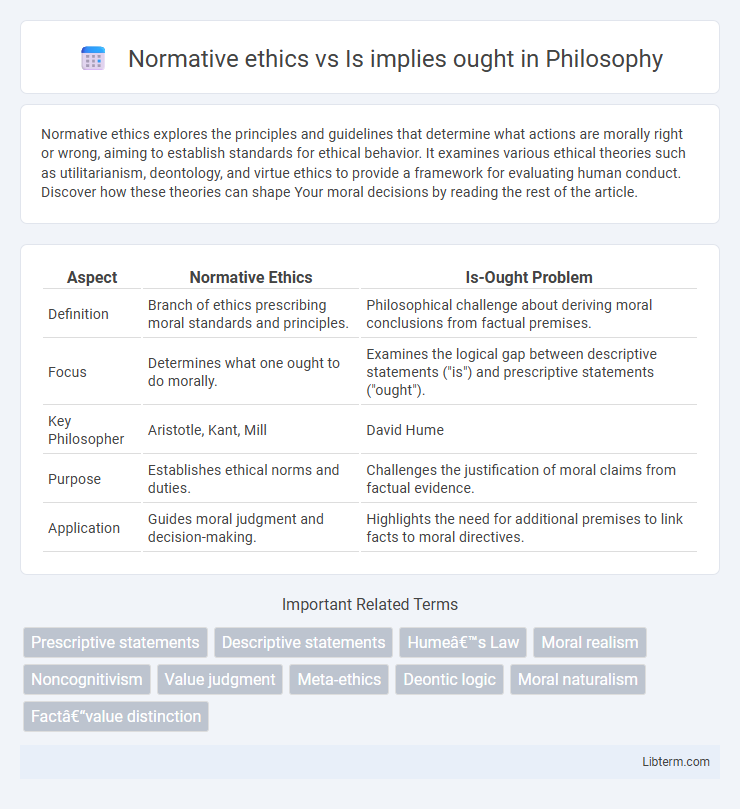Normative ethics explores the principles and guidelines that determine what actions are morally right or wrong, aiming to establish standards for ethical behavior. It examines various ethical theories such as utilitarianism, deontology, and virtue ethics to provide a framework for evaluating human conduct. Discover how these theories can shape Your moral decisions by reading the rest of the article.
Table of Comparison
| Aspect | Normative Ethics | Is-Ought Problem |
|---|---|---|
| Definition | Branch of ethics prescribing moral standards and principles. | Philosophical challenge about deriving moral conclusions from factual premises. |
| Focus | Determines what one ought to do morally. | Examines the logical gap between descriptive statements ("is") and prescriptive statements ("ought"). |
| Key Philosopher | Aristotle, Kant, Mill | David Hume |
| Purpose | Establishes ethical norms and duties. | Challenges the justification of moral claims from factual evidence. |
| Application | Guides moral judgment and decision-making. | Highlights the need for additional premises to link facts to moral directives. |
Introduction to Normative Ethics
Normative ethics explores the principles and criteria that determine what actions are morally right or wrong, aiming to establish guidelines for ethical behavior. The "is implies ought" problem, famously articulated by David Hume, challenges the transition from descriptive statements about the world ("is") to prescriptive ethical claims ("ought"), highlighting a critical issue in moral philosophy. Understanding this distinction is essential in normative ethics as it addresses how value judgments can or cannot be logically derived from factual premises.
Understanding the "Is-Ought" Problem
The "Is-Ought" problem, identified by philosopher David Hume, highlights the challenge of deriving prescriptive moral statements (what ought to be) solely from descriptive facts (what is). Normative ethics addresses this issue by developing frameworks, such as consequentialism and deontology, that justify ethical norms beyond empirical observations. Understanding this distinction is crucial for analyzing ethical theories and avoiding logical fallacies in moral reasoning.
Historical Background: Hume’s Law
David Hume's Law, formulated in the 18th century, articulates the "is-ought problem," highlighting the logical gap between descriptive statements (what is) and prescriptive statements (what ought to be). This philosophical insight challenges normative ethics by emphasizing that moral conclusions cannot be derived solely from factual premises without additional normative assumptions. The historical significance of Hume's Law continues to influence ethical theory by underscoring the necessity to justify moral prescriptions beyond empirical observations.
Key Theories in Normative Ethics
Normative ethics explores moral principles that govern right and wrong behavior, prominently featuring key theories such as utilitarianism, deontology, and virtue ethics. The "is-ought" problem, articulated by philosopher David Hume, highlights the challenge of deriving prescriptive moral statements ("ought") solely from descriptive facts ("is"). Understanding this distinction is crucial for evaluating how normative ethical theories justify moral obligations beyond empirical observations.
The Logical Gap: From "Is" to "Ought
The logical gap from "is" to "ought" highlights the challenge in normative ethics of deriving ethical prescriptions solely from descriptive statements about reality. David Hume emphasized that factual claims about what "is" cannot inherently dictate what "ought" to be done, revealing a fundamental problem in moral philosophy called the is-ought problem. Normative ethics seeks to bridge this gap by introducing moral principles or values that justify ethical obligations beyond empirical facts.
Normative Ethics and Value Judgments
Normative ethics provides a framework for determining what actions are morally right or wrong based on value judgments, guiding behavior through principles such as utilitarianism, deontology, and virtue ethics. It addresses questions of what one ought to do by establishing ethical standards that go beyond descriptive statements. The is-ought problem highlights the challenge of deriving prescriptive norms from factual observations, emphasizing the importance of normative ethics in bridging the gap between facts and moral obligations.
Critiques of the "Is Implies Ought" Fallacy
Critiques of the "Is Implies Ought" fallacy emphasize that factual statements about the world cannot directly determine ethical prescriptions without additional normative premises. Philosophers like David Hume argue that deriving an "ought" solely from an "is" overlooks the necessity of value judgments or moral principles. This fallacy challenges the logical leap from descriptive facts to prescriptive claims, highlighting the need for explicit moral frameworks in normative ethics.
Practical Implications in Moral Reasoning
Normative ethics provides structured frameworks for evaluating moral actions, emphasizing what individuals ought to do based on ethical principles. The "is implies ought" problem highlights the logical gap between descriptive statements about what is and prescriptive claims about what ought to be, posing challenges in deriving moral directives solely from facts. Practical implications in moral reasoning require bridging this gap by integrating normative theories with empirical realities to guide ethical decision-making effectively.
Reconciling Facts and Moral Norms
Normative ethics provides frameworks for determining what ought to be done, addressing moral norms beyond mere factual statements. The is-ought problem highlights the challenge of deriving prescriptive moral conclusions solely from descriptive facts. Reconciling facts and moral norms involves integrating empirical evidence with ethical principles to justify normative claims coherently.
Conclusion: The Relationship Between "Is" and "Ought
The relationship between "is" and "ought" in normative ethics highlights the challenge of deriving moral prescriptions from empirical facts, as pointed out by Hume's law. Normative ethics seeks to establish principles of right action independent of descriptive statements, emphasizing that factual states of the world do not automatically determine ethical obligations. Consequently, bridging the gap between "is" and "ought" requires a foundational normative premise that connects facts to values within moral reasoning.
Normative ethics Infographic

 libterm.com
libterm.com